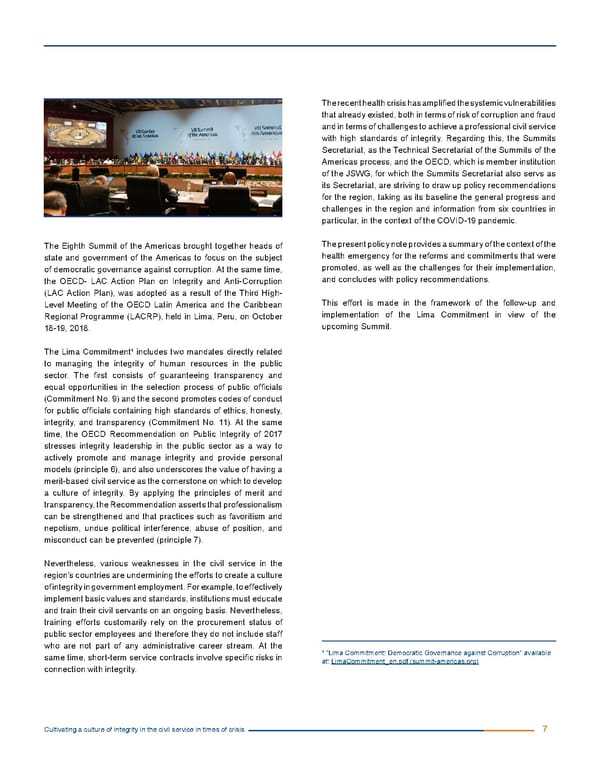The recent health crisis has amplified the systemic vulnerabilities that already existed, both in terms of risk of corruption and fraud and in terms of challenges to achieve a professional civil service with high standards of integrity. Regarding this, the Summits Secretariat, as the Technical Secretariat of the Summits of the Americas process, and the OECD, which is member institution of the JSWG, for which the Summits Secretariat also servs as its Secretariat, are striving to draw up policy recommendations for the region, taking as its baseline the general progress and challenges in the region and information from six countries in particular, in the context of the COVID-19 pandemic. The Eighth Summit of the Americas brought together heads of The present policy note provides a summary of the context of the state and government of the Americas to focus on the subject health emergency for the reforms and commitments that were of democratic governance against corruption. At the same time, promoted, as well as the challenges for their implementation, the OECD- LAC Action Plan on Integrity and Anti-Corruption and concludes with policy recommendations. (LAC Action Plan), was adopted as a result of the Third High- Level Meeting of the OECD Latin America and the Caribbean This effort is made in the framework of the follow-up and Regional Programme (LACRP), held in Lima, Peru, on October implementation of the Lima Commitment in view of the 18-19, 2018. upcoming Summit. 4 The Lima Commitment includes two mandates directly related to managing the integrity of human resources in the public sector. The first consists of guaranteeing transparency and equal opportunities in the selection process of public officials (Commitment No. 9) and the second promotes codes of conduct for public officials containing high standards of ethics, honesty, integrity, and transparency (Commitment No. 11). At the same time, the OECD Recommendation on Public Integrity of 2017 stresses integrity leadership in the public sector as a way to actively promote and manage integrity and provide personal models (principle 6), and also underscores the value of having a merit-based civil service as the cornerstone on which to develop a culture of integrity. By applying the principles of merit and transparency, the Recommendation asserts that professionalism can be strengthened and that practices such as favoritism and nepotism, undue political interference, abuse of position, and misconduct can be prevented (principle 7). Nevertheless, various weaknesses in the civil service in the region’s countries are undermining the efforts to create a culture of integrity in government employment. For example, to effectively implement basic values and standards, institutions must educate and train their civil servants on an ongoing basis. Nevertheless, training efforts customarily rely on the procurement status of public sector employees and therefore they do not include staff who are not part of any administrative career stream. At the same time, short-term service contracts involve specific risks in 4 “Lima Commitment: Democratic Governance against Corruption” available at: LimaCommitment_en.pdf (summit-americas.org) connection with integrity. Cultivating a culture of integrity in the civil service in times of crisis 7
 Cultivating a culture of integrity in the civil service in times of crisis. Page 14 Page 16
Cultivating a culture of integrity in the civil service in times of crisis. Page 14 Page 16